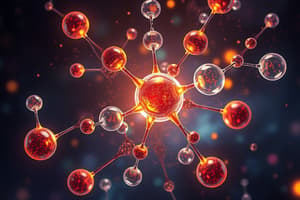Podcast
Questions and Answers
How has organic chemistry transformed in the last decade?
How has organic chemistry transformed in the last decade?
- Through the integration of AI, automation, and data-driven research (correct)
- By focusing solely on theoretical concepts
- Through manual experimentation only
- By disregarding carbon-based compounds
What is one area where AI algorithms are being utilized in organic chemistry research?
What is one area where AI algorithms are being utilized in organic chemistry research?
- Optimizing mechanical engineering processes
- Understanding nuclear physics concepts
- Deciphering intricate reaction mechanisms (correct)
- Predicting the properties of known molecules only
How does the integration of AI with symbolic mathematics benefit organic chemistry?
How does the integration of AI with symbolic mathematics benefit organic chemistry?
- Revealing new insights into the complexities of organic chemistry (correct)
- Aiding in archaeological studies
- Improving marine biology research
- Enhancing the study of astronomy
What is a key advantage of using AI-powered techniques in organic chemistry?
What is a key advantage of using AI-powered techniques in organic chemistry?
What role do heuristic rules play in the application of AI models in organic chemistry?
What role do heuristic rules play in the application of AI models in organic chemistry?
How do AI-powered techniques contribute to a more accurate understanding of chemical reactions?
How do AI-powered techniques contribute to a more accurate understanding of chemical reactions?
What is one way automation has benefited organic chemistry research?
What is one way automation has benefited organic chemistry research?
Which automated equipment has proven to be invaluable in organic chemistry research?
Which automated equipment has proven to be invaluable in organic chemistry research?
What challenges remain in the integration of AI and automation in organic chemistry?
What challenges remain in the integration of AI and automation in organic chemistry?
How can chemists benefit from addressing the challenges presented by AI and automation in organic chemistry?
How can chemists benefit from addressing the challenges presented by AI and automation in organic chemistry?
What does the integration of AI and automation have the potential to revolutionize in organic chemistry?
What does the integration of AI and automation have the potential to revolutionize in organic chemistry?
Why is it essential to ensure that the benefits of AI and automation are accessible to all in the field of organic chemistry?
Why is it essential to ensure that the benefits of AI and automation are accessible to all in the field of organic chemistry?
Flashcards are hidden until you start studying
Study Notes
Transforming Organic Chemistry with AI and Automation
Organic chemistry, the discipline focused on the study, synthesis, and understanding of carbon-based compounds, has undergone profound changes over the last decade, driven by the convergence of automation, AI, and data-driven research. This transformation has the potential to reshape the field, accelerate scientific discovery, and address pressing societal challenges.
AI in Organic Chemistry Research
AI algorithms and machine learning are being harnessed to decipher intricate reaction mechanisms, predict the properties of new molecules, and optimize experimental conditions. The integration of AI with symbolic mathematics has the potential to reveal new insights into the complexities of organic chemistry, leading to improved teaching methods and a deeper understanding of chemical reactions.
Knowledge Discovery and Embedding
AI-powered techniques enable the extraction of knowledge from vast amounts of data, thus narrowing the gap between predictive models and experimental platforms. Organic chemistry is replete with heuristic rules, such as Markovnikov's and Baldwin's rules. Embedding these rules into AI models ensures that the predictions are more aligned with the nuanced perspectives of organic chemists, leading to a more accurate and reliable understanding of chemical reactions.
Automation and Organic Chemistry
Automation has facilitated the optimization of reaction conditions, the improvement of safety standards, and the reduction of experimental error. Automated equipment, such as robots and microfluidic reactors, has already proven to be invaluable tools in organic chemistry research, enabling the rapid synthesis of complex molecules at an unprecedented scale.
Challenges and Opportunities
Although the potential benefits of AI and automation in organic chemistry are immense, challenges remain. For example, the quality and accessibility of data, the complexity of chemistry-specific algorithms, and the need for a diverse and inclusive workforce all present significant hurdles. However, these challenges also provide opportunities for growth and innovation, as chemists collaborate to develop new tools, techniques, and approaches to harness the power of AI and automation.
The Future of Organic Chemistry
The integration of AI and automation has the potential to revolutionize organic chemistry, leading to new discoveries, more efficient methods, and the development of green chemistry. By fostering a culture of collaboration and innovation, chemists can harness the power of technology to drive scientific discovery and address global challenges. As the field continues to evolve and adapt to new technologies, it is essential to ensure that the benefits of AI and automation are accessible to all, regardless of background or location.
Studying That Suits You
Use AI to generate personalized quizzes and flashcards to suit your learning preferences.




